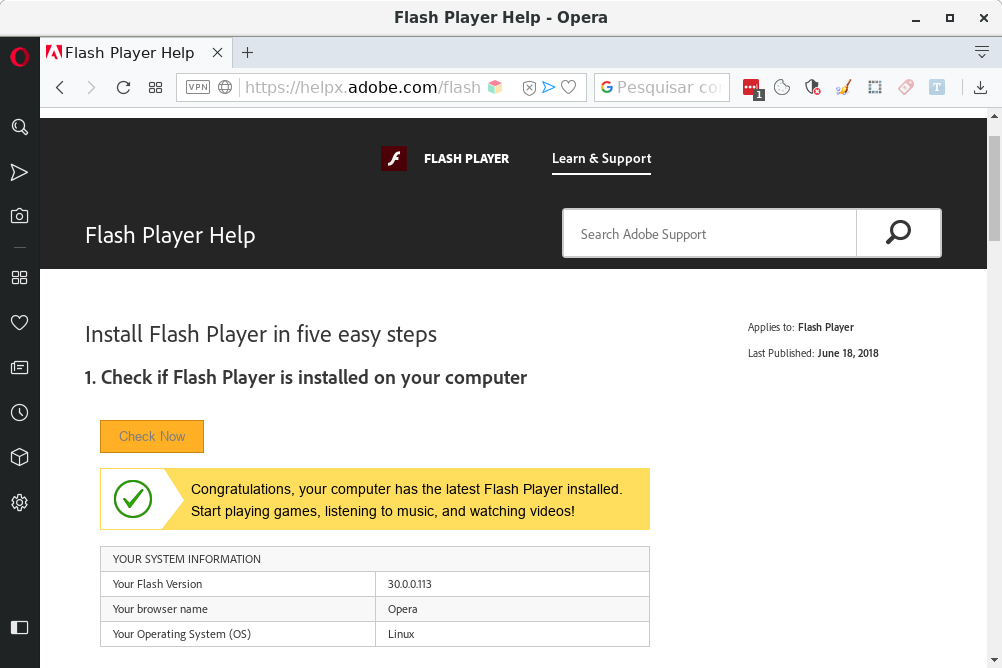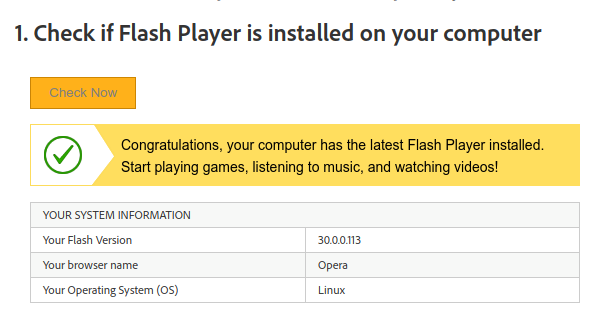Definitive fix for flashplayer on Debian 9.4.0 (Stretch) and others
-
bombacha last edited by bombacha
Last year I've made a post asking for support and I didn't have the time to look in to this, a month ago I gave Opera another try and with more time in hand I could crack this one for good.
Ubuntu is Debian based but is not Debian, so packages build for Ubuntu is not always available or compatible with Debian, forcing a install can brake the OS and cause a lot of trouble that people are not looking for.
This are the steps:
- Download the last flash player from Adobe and extract somewhere
- Create a folder at your home with
mkdir -p ~/.config/flashplayer - Copy the files
libpepflashplayer.soandmanifest.jsonto~/.config/flashplayerwithcopy libpepflashplayer.so manifest.json ~/.config/flashplayer - Create a system default flashplayer directory with
sudo mkdir /usr/lib/adobe-flashplugin - Link the files we need to that directory with
sudo ln -s ~/.config/flashplayer/libpepflashplayer.so /usr/lib/adobe-flashpluginandsudo ln -s ~/.config/flashplayer/manifest.json /usr/lib/adobe-flashplugin
Flash player in Opera should work by now but it doesn't, Opera needs some environment information, for that we need some extra steps as follows:
- Edit
~/.bashrcand add the following at the end
export flash_library="/usr/lib/adobe-flashplugin/libpepflashplayer.so" export flash_version=$(grep '"version":' /usr/lib/adobe-flashplugin/manifest.json | cut -d\" -f4) export CHROMIUM_FLAGS="$CHROMIUM_FLAGS --ppapi-flash-path=$flash_library --ppapi-flash-version=$flash_version"- Save, exit your session and start Opera
Goto to this site and click at Check Now, if you done all right, you should see the screen bellow:

Now every time you need to update the flashplayer, all you have to do is to copy the new files over the old ones at your own home at .config/flashplayer.
PS: It might not be necessary, but maybe your system may ask for this two fonts
sudo apt-get install ttf-dejavu ttf-xfree86-nonfree -
A Former User last edited by
Or...
You can just install the flashplugin-chromium package from deb-multimedia.org (dmo for short) and let apt do all that work for you, including the update.
What you suggest for bashrc is located in /etc/chromium.d/flashplayer-chromium.conf and the .so and .json files are placed in a directory suggested by adobe itself$ cat /etc/chromium.d/flashplayer-chromium.conf # Make sure that Chromium finds the plugin: flash_library="/usr/lib/adobe-flashplugin/libpepflashplayer.so" flash_version=$(grep '"version":' /usr/lib/adobe-flashplugin/manifest.json | cut -d\" -f4) if [ -f $flash_library ]; then CHROMIUM_FLAGS="$CHROMIUM_FLAGS --ppapi-flash-path=$flash_library --ppapi-flash-version=$flash_version" fiThe dmo repo is a well known repo for debian, with dozens of mirrors worldwide and it is run by a very responsible maintainer who updates its packages regularly.
It was my suggestion to include it in his repo a couple of years ago and I asked him to do so because the package in the main debian repo (pepperflashplugin-nonfree) is just poorly maintained rubbish.And the relevant screenshot for proof

Opera is set to allow all sites to run flash.
-
bombacha last edited by
Yes, I know that works too!

I had a very bad experience with deb-multimedia.org, the apt decided to upgrade things using that repo and broke a lot of things on my system, so I pass. It took me a lot of time to discover that Opera requires that environment and not just the so in the right place.Now the news is out there, there is no more need to use deb-multimedia.org and any Linux system can make use of it. I don't use flash anymore, my config is set to block it, but for those that need it.
It's possible to run scripts or commands apt after an upgrade or update comand:
https://unix.stackexchange.com/questions/70686/how-to-run-a-command-after-apt-get-upgradeIf people are so in need of flash, it's possible to create a script to update not only flash but libffmpeg also among with the trivial
apt-get update && apt-get upgrade.